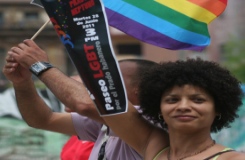BY NATASHA BARSOTTI – Gay activists in Cuba locked lips in Havana in a demonstration that called on the government for respect and further recognition of their civil rights, ahead of the Caribbean island’s Pride march this weekend, the Miami Herald reports.
![]()
The report says 50 people signed a petition listing a series of demands, which they delivered to the National Assembly of People’s Power, following the Kiss-In for Diversity and Equality demonstration. The group, Project Rainbow, organized the event held at the Rámon Fonst sports arena.
In the petition, activists called on the government to “fully comply with international agreements it has signed on human rights, especially those that apply to LGBT rights,” the Herald quotes gay rights activist Ignacio Estrada as saying. The document also calls on lawmakers to investigate hard-labour camps, where gays and political dissidents were held during the 1960s and to look into workplace discrimination claims.
In a statement published on Gay Star News, Project Rainbow organizers invited the government to “make the LGBT community in Cuba visible,” adding, “We are part of the nation.”
The island’s second annual Pride march, organized by the Cuban League Against AIDS, the Open Door Foundation and LGBT Observatory, is scheduled to take place on July 1. The groups are independent of Cuba’s National Center for Sex Education (CENESEX), whose director is Mariela Castro, the daughter of Cuban president Raúl Castro.
Police arrested a number of gay activists in an attempt to thwart last year’s Pride march, but about 20 still managed to participate, the Herald reports.

Mariela Castro successfully lobbied the government to cover sex reassigmnent surgery under the national health plan and has also spoken out in favour of same-sex marriage.
An Associated Press (AP) report carried in The Advocate notes that she addressed a group of medical professionals and transgender advocates in San Francisco last month, where she said, “If we don’t change our patriarchal and homophobic culture . . . we cannot advance as a new society, and that’s what we want, the power of advancement through socialism. We will establish relationships on the basis of social justice and social equality . . . it seems like Utopia, but we can change it.”

A number of Cuban-Americans criticized the US government for allowing Castro entry into the US, pointing to the island’s record of repressing human rights — including queer rights — more generally.
Landing image source: towleroad.com

 Why you can trust Xtra
Why you can trust Xtra


